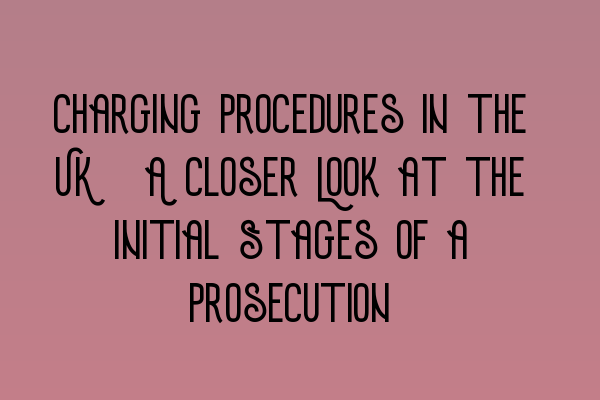Charging Procedures in the UK: A Closer Look at the Initial Stages of a Prosecution
Welcome to another informative article from SQE Criminal Law & Practice Law UK. In this blog post, we aim to provide you with a comprehensive overview of the charging procedures in the UK, focusing on the initial stages of a prosecution. Understanding these procedures is crucial for aspiring criminal lawyers and anyone interested in the criminal justice system.
The Initial Stages of a Prosecution
When a criminal offense is committed, the police start the investigative process, gathering evidence and identifying potential suspects. Once they have sufficient evidence to support a charge, the next step is to initiate the charging process.
Charging a suspect requires the police to present the evidence to the Crown Prosecution Service (CPS) in England and Wales, or the Procurator Fiscal in Scotland. These prosecutorial bodies decide whether to proceed with the case based on the evidence presented. It’s important to note that the decision to charge lies solely with the CPS or Procurator Fiscal, not the police.
Before making a charging decision, the CPS or Procurator Fiscal assesses the evidence to determine if there is a realistic prospect of conviction and if it is in the public interest to proceed with the case. This involves reviewing witness statements, forensic evidence, CCTV footage, and any other relevant evidence.
If the decision is made to proceed with the case, the suspect will be formally charged. The charge is a formal statement informing the suspect of the criminal offense they are accused of committing. It is important to note that being charged with an offense does not indicate guilt; it simply means that there is sufficient evidence to bring the case to court.
Types of Charges
There are different types of charges that can be brought against a suspect, depending on the severity of the offense. Common types of charges include:
- Summary Offenses – These are less serious offenses that are typically tried in the Magistrates’ Court. Examples include minor assaults, public order offenses, and some traffic offenses.
- Indictable Offenses – These are more serious offenses that warrant a trial in the Crown Court. Examples include murder, rape, and large-scale fraud.
- Either-way Offenses – These offenses can be tried in either the Magistrates’ Court or the Crown Court, depending on their complexity and severity. The defendant is given the opportunity to elect the mode of trial.
The type of charge determines the court where the case will be heard and the potential penalties the defendant may face upon conviction.
Conclusion
Understanding the initial stages of a prosecution and the charging procedures in the UK is essential for anyone involved in criminal law. It provides a solid foundation for aspiring criminal lawyers and enhances one’s understanding of the justice system.
For those preparing for the SQE exams, having a thorough knowledge of charging procedures is crucial, as it often forms part of the assessment. To enhance your preparation, be sure to check out our related articles:
- SQE 1 Practice Exam Questions
- SQE 1 Practice Mocks FLK1 FLK2
- SQE 2 Preparation Courses
- SQE 1 Preparation Courses
- SRA SQE Exam Dates
We hope you found this article informative and valuable. If you have any further questions or would like to explore our SQE preparation courses, feel free to contact us. Good luck with your studies and future legal career!
